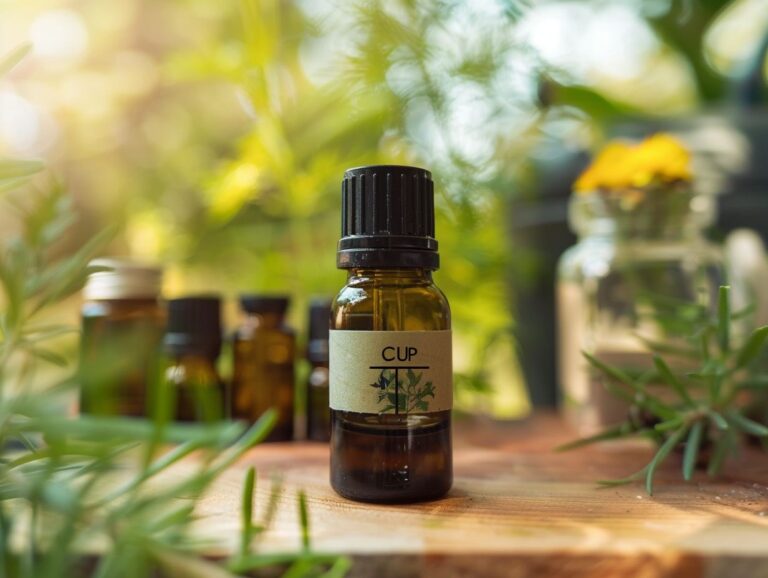Do Essential Oils Contain Gluten
Essential oils have gained popularity for their various health and wellness benefits, but have you ever wondered if they contain gluten?
We explore the possible sources of gluten in essential oils and whether there is scientific evidence to support its presence. We also discuss the risks of using essential oils containing gluten, such as allergic reactions and digestive issues.
Learn how to determine if an essential oil contains gluten and discover gluten-free alternatives as we delve into the world of essential oils and gluten.
Key Takeaways:
What Are Essential Oils?
Essential oils are highly concentrated plant extracts that capture the aromatic essence and beneficial compounds of a plant. Young Living Essential Oils, known for their quality and purity, offer a wide range of essential oils derived from various plant sources, promoting holistic healing and natural remedies.
These oils are extracted through various methods such as steam distillation, cold pressing, or solvent extraction, ensuring that the therapeutic properties of the plants are preserved. Each essential oil has its unique composition and benefits, ranging from uplifting mood and promoting relaxation to soothing muscle pain and supporting overall well-being.
Young Living is dedicated to providing essential oils that are pure and free from synthetic additives, allowing users to harness the power of nature for both physical and emotional well-being. Their rigorous quality control measures ensure that each bottle of oil meets their high standards, making them a trusted choice for those seeking natural remedies.
What Is Gluten?
Gluten is a group of proteins found in wheat, barley, and rye, which can trigger adverse reactions in individuals with gluten intolerance or sensitivity. The FDA regulates the labeling of gluten-containing products due to the prevalence of gluten-related allergies and sensitivities.
Individuals with gluten intolerance may experience gastrointestinal issues, fatigue, and skin problems after consuming gluten-containing foods. For those with celiac disease, an autoimmune disorder triggered by gluten, even small amounts can cause severe intestinal damage.
Gluten-free diets have become increasingly popular as more people are diagnosed with gluten-related conditions.
The FDA’s role in ensuring accurate gluten labeling on products is crucial to assist consumers in making informed choices and managing their health effectively.
Can Essential Oils Contain Gluten?
There is a common concern about whether essential oils can contain gluten, especially for individuals with gluten sensitivities or allergies. As the FDA does not regulate the gluten content in essential oils, it is essential to understand the potential risks associated with gluten presence in organic essential oil products.
Gluten is a protein found in wheat, barley, and rye, which can trigger adverse reactions in those sensitive to it. In terms of essential oils, the issue arises from the manufacturing process.
Contamination may occur during production if the oils come into contact with gluten-containing ingredients or equipment. Due to the lack of specific regulations, individuals avoiding gluten need to be vigilant and opt for oils labeled as gluten-free to minimize any potential health risks. Awareness and education play a vital role in making informed choices when selecting gluten-free products.
What Are the Possible Sources of Gluten in Essential Oils?
Gluten can potentially be present in essential oils if the oils are derived from gluten-containing sources such as wheat germ oil or barley seed oil. Ensuring the quality and purity of essential oils at the source, like using gluten-free seeds, can mitigate the risk of gluten contamination.
It is crucial for producers of essential oils to be diligent in their sourcing practices to avoid unintentional gluten exposure. Apart from the seeds used, the manufacturing process itself plays a significant role in preventing cross-contamination with gluten. For individuals with celiac disease or gluten sensitivity, even trace amounts of gluten in essential oils could trigger adverse reactions. Therefore, selecting suppliers that adhere to strict gluten-free protocols and certifications is essential to maintain the integrity of gluten-free products.
Is There Any Scientific Evidence to Support the Presence of Gluten in Essential Oils?

Scientific research on the presence of gluten in essential oils is limited, but it is crucial to acknowledge the potential risks for individuals with gluten sensitivities.
The therapeutic blends and formulations of essential oils may require further scrutiny to ensure gluten-free compositions. While essential oils themselves are generally considered gluten-free, the concern arises when they are blended or diluted with carrier oils that might contain traces of gluten. These carrier oils can sometimes be derived from gluten-containing grains like wheat or barley, which can pose a risk for those sensitive to gluten. Therefore, individuals seeking gluten-free options in aromatherapy need to carefully examine the ingredients and production processes of essential oil blends to avoid any potential sources of gluten.
What Are the Risks of Using Essential Oils Containing Gluten?
Using essential oils containing gluten can pose risks for individuals with gluten sensitivity or celiac disease, leading to adverse allergic reactions or digestive issues.
It is crucial for those with gluten sensitivities to opt for gluten-free essential oils to avoid potential health complications. Gluten can trigger immune responses in sensitive individuals, causing inflammation and discomfort. By selecting gluten-free options, individuals can support their overall health and well-being. Embracing natural remedies that are free from gluten can also offer a more holistic approach to healing and wellness, promoting balance in the body. These natural alternatives can provide nourishment and support for various health concerns without the risk of gluten-related adverse effects.
Can Essential Oils with Gluten Cause an Allergic Reaction?
Essential oils containing gluten can trigger allergic reactions in individuals with gluten intolerance, manifesting as skin rashes or irritations. Proper care and attention to allergens in skincare products are essential for maintaining skin health and preventing adverse reactions.
Gluten, a protein found in wheat, barley, and rye, can often be present in essential oils due to cross-contamination or intentional usage. Individuals with gluten sensitivity need to be cautious as even a small amount of gluten exposure can lead to skin issues. Allergic reactions can vary from mild itching to severe dermatitis, making it crucial to read labels and choose gluten-free options. Regular patch testing can help identify potential triggers, allowing for a tailored skincare routine that avoids allergens.
Can Essential Oils with Gluten Cause Digestive Issues?
Essential oils containing gluten may lead to digestive issues in individuals with gluten sensitivity or celiac disease, causing discomfort or gastrointestinal distress.
Gluten, a protein found in wheat, barley, and rye, can trigger adverse reactions in those with gluten-related disorders, such as bloating, diarrhea, or abdominal pain. Particularly for individuals with celiac disease, consuming gluten-containing essential oils can exacerbate symptoms and hinder proper digestion.
Seeking gluten-free alternatives is crucial for managing digestive health…
Fortunately, there are various gluten-free essential oils available, derived from sources like lavender, peppermint, or eucalyptus, which can still provide aromatic benefits without the risk of gluten-induced discomfort.
Moreover, therapeutic compounds, such as gingerol in ginger essential oil or limonene in citrus oils, demonstrate potential in supporting digestive wellness by aiding in digestion, reducing inflammation, and soothing gastrointestinal issues.
How Can You Determine if an Essential Oil Contains Gluten?
To identify if an essential oil contains gluten, reading labels carefully for gluten-related ingredients is crucial. Researching the brand’s gluten-free certifications and consulting with healthcare professionals can provide additional guidance on choosing gluten-free essential oils for health and cosmetic purposes.
Gluten can be present in essential oils due to potential cross-contamination during the manufacturing process, making label inspection imperative. Look out for common gluten sources like wheat, barley, rye, and oats listed in the ingredients.
Brands that undergo rigorous gluten testing and hold certifications from reputable organizations such as the Gluten-Free Certification Organization (GFCO) or the Celiac Support Association (CSA) are likely to offer safer options.
Healthcare professionals, especially dermatologists or allergists, can offer tailored advice on selecting gluten-free products based on individual sensitivities and health conditions.
Reading Labels

Reading labels on essential oil products is essential to identify any gluten-containing ingredients.
Look for gluten-related terms or symbols that indicate the presence of gluten in the formulation, ensuring transparency and knowledge-based decision making. It is crucial for individuals with gluten sensitivities or allergies to carefully analyze the labels of essential oils to avoid any adverse reactions.
Understanding the role of organic certifications and FDA guidelines can provide consumers with additional confidence in the accuracy of product information. Organic certification ensures that the oils are produced without the use of synthetic pesticides or fertilizers, while adherence to FDA guidelines helps in maintaining the quality and safety standards of essential oils.
Researching the Brand
Conducting thorough research on the brand producing essential oils is essential to verify gluten-free certifications and product quality.
When selecting gluten-free essential oils, the importance of brand research cannot be overstated. By choosing brands that are renowned for their therapeutic-grade and gluten-free options, you are ensuring that you are using products that provide maximum purity and efficacy. Quality is key when it comes to essential oils, especially considering their potential health benefits and the need for strict adherence to gluten-free standards. Opting for reputable brands with a clear commitment to gluten-free formulations guarantees that you are investing in products that meet your specific dietary and health requirements.
Consulting with a Healthcare Professional
Seeking advice from a healthcare professional can provide valuable insights into selecting gluten-free essential oils for individuals with gluten intolerance or allergies. Consultation with a healthcare expert can ensure personalized recommendations for safe and effective product choices.
Healthcare professionals play a critical role in assessing an individual’s specific needs and potential reactions to different products, especially essential oils that may contain gluten traces due to manufacturing processes. By discussing one’s condition, symptoms, and overall health, experts can propose tailored solutions to avoid any adverse effects.
Personalized advice from these professionals can help in identifying gluten-free essential oils that align with dietary and health requirements, ensuring optimal safety and wellness for gluten-sensitive individuals.
What Are Gluten-Free Essential Oil Alternatives?
Opting for gluten-free essential oil alternatives can offer natural remedies without the risk of gluten contamination. Embracing organic and health-promoting essential oils ensures access to the benefits of aromatherapy and holistic healing without gluten-related concerns.
Individuals seeking to maintain a gluten-free lifestyle can benefit greatly from incorporating gluten-free essential oils into their daily wellness routines. These oils are derived from plants, herbs, and flowers, making them inherently free from gluten components, making them suitable for those with gluten sensitivities or celiac disease.
By opting for gluten-free essential oils, one can harness the power of natural plant extracts without the worry of gluten-induced reactions. These oils not only provide aromatic benefits but also offer therapeutic properties that can aid in promoting overall health and well-being.
Are There Essential Oils That Are Naturally Gluten-Free?
Certain essential oils are naturally gluten-free, derived from gluten-free seeds and plant sources. These oils offer therapeutic compounds and natural benefits without gluten contamination, making them suitable choices for individuals seeking gluten-free aromatherapy solutions.
Gluten-free essential oils like lavender, peppermint, and eucalyptus are popular choices due to their soothing and calming effects. They are known to promote relaxation, ease stress, and alleviate headaches. Gluten-free oils are widely used in skincare for their nourishing and revitalizing properties, helping to improve skin health and appearance.
Using gluten-free essential oils in diffusers or massage oils can enhance the overall well-being and create a peaceful atmosphere. These oils are often praised for their natural and pure essence, making them a preferred option for those with gluten sensitivities.
How to Make Your Own Gluten-Free Essential Oils?

Creating your own gluten-free essential oils at home allows for personalized blends using organic and gluten-free ingredients. DIY essential oil recipes offer the flexibility to tailor formulations to individual preferences while ensuring gluten-free and natural remedies for various health and wellness needs.
When embarking on the journey of crafting DIY gluten-free essential oils, it’s important to start with high-quality organic base oils, such as jojoba oil or coconut oil, as they provide a neutral and nourishing foundation. Additionally, essential oils are potent extracts obtained from plants, and choosing reputable brands that guarantee gluten-free and natural products is crucial in ensuring the purity and efficacy of your blends. By experimenting with different essential oil combinations and proportions, you can create personalized blends for aromatherapy, skincare, relaxation, and more, tailored to your specific needs.
Frequently Asked Questions
Do essential oils contain gluten?
No, pure essential oils do not contain gluten. They are typically made from plant materials and do not contain any gluten-containing grains.
Can people with gluten intolerance or celiac disease use essential oils?
Yes, people with gluten intolerance or celiac disease can safely use essential oils as they do not contain gluten. However, it is important to make sure that the oils do not contain any added ingredients that may contain gluten.
Are there any essential oils that may contain traces of gluten?
In rare cases, essential oils may contain traces of gluten if they have been processed or distilled in facilities that also handle gluten-containing grains. It is important to check the labels and contact the manufacturer if you have concerns.
Can essential oils be cross-contaminated with gluten?
Essential oils themselves cannot be cross-contaminated with gluten as they do not contain any gluten particles. However, if they are stored or used in containers or tools that have come in contact with gluten-containing products, cross-contamination may occur. It is important to keep essential oils and their tools separate from any gluten-containing items.
Are there any essential oils that are safe for people with gluten intolerance or celiac disease?
Yes, there are many essential oils that are safe for people with gluten intolerance or celiac disease. Some popular options include lavender, peppermint, tea tree, and lemon essential oils. However, it is always best to consult with a healthcare professional before using any new products.
What should I do if I have a reaction to an essential oil and suspect it may contain gluten?
If you have a reaction to an essential oil and suspect it may contain gluten, it is best to stop using the product and consult with a healthcare professional. They can help determine if the reaction was caused by gluten or another ingredient in the oil and provide appropriate treatment.








One Comment